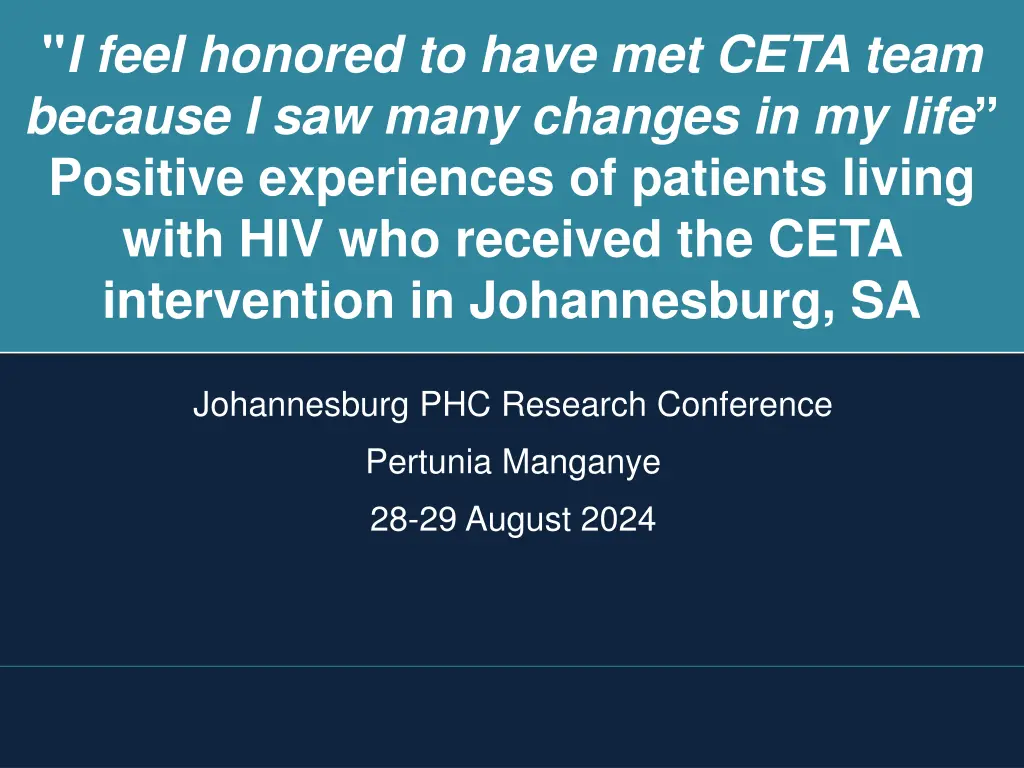
Empowering Women Living with HIV through CETA Intervention
Discover how the Common Elements Treatment Approach (CETA) is making a positive impact on women living with HIV in Johannesburg, South Africa. The CETA intervention addresses mental health and intimate partner violence issues, providing tailored support to improve overall well-being and HIV outcomes. Learn about the study design, safety measures, and follow-up assessments conducted by the Health Economics and Epidemiology Research Office at the University of the Witwatersrand.
Download Presentation

Please find below an Image/Link to download the presentation.
The content on the website is provided AS IS for your information and personal use only. It may not be sold, licensed, or shared on other websites without obtaining consent from the author. If you encounter any issues during the download, it is possible that the publisher has removed the file from their server.
You are allowed to download the files provided on this website for personal or commercial use, subject to the condition that they are used lawfully. All files are the property of their respective owners.
The content on the website is provided AS IS for your information and personal use only. It may not be sold, licensed, or shared on other websites without obtaining consent from the author.
E N D
Presentation Transcript
"I feel honored to have met CETA team because I saw many changes in my life Positive experiences of patients living with HIV who received the CETA intervention in Johannesburg, SA Johannesburg PHC Research Conference Pertunia Manganye 28-29 August 2024
Background Mental health and intimate partner violence (IPV) significantly impact women living with HIV High demand for mental health services, in the region is met with limited resources, creating a substantial gap in care. HIV-positive women who experience IPV are at high risk of: o Mental health challenges such as depression and anxiety These challenges can impact HIV outcomes, such as: o Adherence to treatment o Viral suppression o Retention in care Health Economics and Epidemiology Research Office HE RO 2 Wits Health Consortium University of the Witwatersrand
Common Elements Treatment Approach (CETA) CETA is a flexible, cognitive, behavioral therapy-based intervention. Can be delivered by lay counselors. Tailored to address co-occurring mental and behavioral health issues. Potential to bridge the gap in mental health support for people living with HIV. Health Economics and Epidemiology Research Office HE RO 2 Wits Health Consortium University of the Witwatersrand
Introduction to the Common Elements Treatment Approach (CETA) Health Economics and Epidemiology Research Office HE RO 2 Wits Health Consortium University of the Witwatersrand
Study Design Enrolled 400 women who have experienced IPV within the past 12 months Participants had initiated ART and had at least faced challenges like: o Unsuppressed viral load o Defaulted treatment o Missed or had come late for their clinic visit Conducted in two clinics in Johannesburg, South Africa o Themba Lethu Clinic in Helen Joseph Hospital o Zola Clinic in Soweto 200 participants were randomly assigned to 12 weeks of CETA sessions and another 200 into control arm with SMS safety checks. Health Economics and Epidemiology Research Office HE RO 2 Wits Health Consortium University of the Witwatersrand
Safety Measures and Follow-up All participants received an initial safety assessment and safety plan Follow-up assessments at 3 and 12 months post-enrollment. Gathering of participant feedback on their experiences in the study. o 310 follow-up assessments at 3 months. o 289 follow-up assessments at 12 months (assessments ongoing). Health Economics and Epidemiology Research Office HE RO 2 Wits Health Consortium University of the Witwatersrand
Life experiences and emotions before CETA Starting CETA, I was emotionally not okay. I couldn't accept many situations that were happening to me. My partner was very abusive, and I didn't know how to tell him to go and start testing and taking his HIV medication. I was very worried about my health. My partner used to abuse me verbally, emotionally, and physically before I was pregnant and after I was pregnant. I was suffering from drug abuse and having a lot of depression and anxiety Health Economics and Epidemiology Research Office HE RO 2 Wits Health Consortium University of the Witwatersrand
Positive Feedback Experiences After CETA Participants highlighted the support received from CETA counsellors He no longer abuses me. I was able to talk to him to start taking his medication. Now we only argue like normal couples. "I see many changes in my life may the CETA team spread the word to other women who need help like me." Now my life has changed because I got helped by CETA. I am so proud today about life . It is not quite perfect, but it is better than before. "I saw changings in my life through CETA counselling and the support they gave me. I feel strong, I see happiness in my family. Health Economics and Epidemiology Research Office HE RO 2 Wits Health Consortium University of the Witwatersrand
Experiences from the Control Arm after SMS safety checks Even participant in the control arm reported benefits The CETA sms helped me a lot thinking of my problems Answering safety messages helped [me] to stay focused and not think of doing something stupid like wanting to kill myself. The SMSs that I was receiving from the study helped keep me safe. Health Economics and Epidemiology Research Office HE RO 2 Wits Health Consortium University of the Witwatersrand
MH Care integration into HIV care Introducing CETA in primary health care facilities could have the potential to address the mental healthcare gaps CETA counselors within the HIV clinics can improve the capacity to identify and support IPV and mental health concerns Use of lay counselors an opportunity for low-cost resource for MH support capacity CETA offers a promising approach to improve mental health and HIV outcomes for women experiencing IPV Health Economics and Epidemiology Research Office HE RO 2 Wits Health Consortium University of the Witwatersrand
Limitation Feasibility in clinical setting Limited resources Enough staff Space CETA-trained providers Assessors Counsellors Supervisors Health Economics and Epidemiology Research Office HE RO 2 Wits Health Consortium University of the Witwatersrand
Research challenges on the ground Stigma and Discrimination Access to Participants Retention of Participants Safety checks Follow ups Referral networks or systems Other health care facilities Mental health services Social services Community organisations Health Economics and Epidemiology Research Office HE RO 2 Wits Health Consortium University of the Witwatersrand
Thank you Questions and Discussion Health Economics and Epidemiology Research Office HE RO 2 Wits Health Consortium University of the Witwatersrand






















